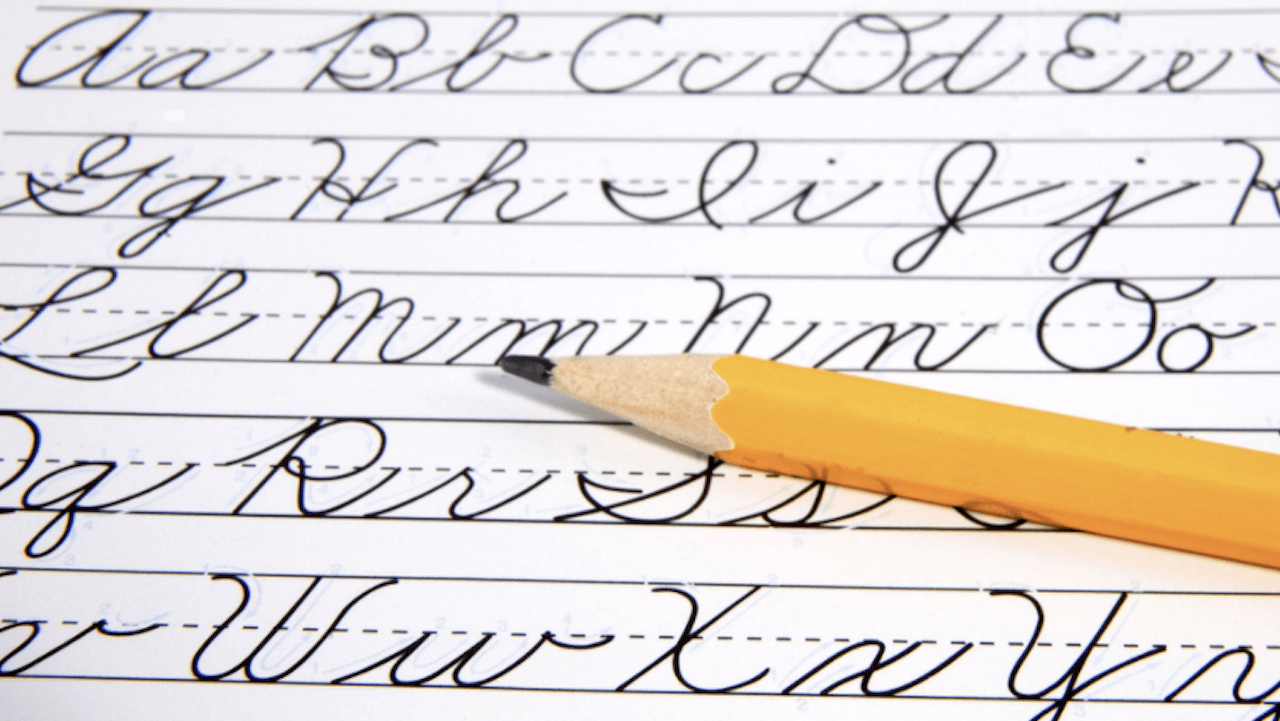I’VE BEEN
told that cursive handwriting is no longer being taught in public schools.
This alarms me for many reasons, though I’m sure it’s all explained as progress, as new teaching methods, as a push for STEM-based competitive curricula. But the real reason for removing handwriting from classrooms is, I suspect, much more sinister: our increasing discomfort with Beauty.
Beauty and uniqueness go hand in hand. Beauty loves repetition, but not uniformity. She wants variations on themes, not blue-grey mimeographs. Beauty resides in the unique quality of a person’s handwriting. Maybe this is to see Her “through a glass darkly”—but a dim reflection is infinitely greater than an electronic approximation. It’s the difference between Virtue and virtual.
Beauty is not something that can be reduced to slogans or electronically transmittable forms. Beauty speaks on too many levels simultaneously for reduction. Of course, there are push-backs against electronic uniformity—from the small-farm movement to the gender-fluidity movement—but unless these are grounded in a love of beauty, they will likely become just as commodified and commercialized as the mass-production they are attempting to avoid.
The act of handwriting, its grounding in Beauty, is irreplaceable. Handwriting involves the collaboration of the individual creative mind with the whole of an ancient written language. It can become a craft and a relationship between a writer and reader. You might ask how this is different from sending an email—or reading a blog post. Besides the obvious—that handwriting leaves a mark on the physical world—I believe it also leaves a mark within the persons involved in the creation and communication of the writing.
When the Internet is down, I may still type on my computer. When the electricity is off, I may still write with pen and paper. If I have no paper, likely I still have graphite or ink. With none of these, I have nothing but my mind, my hand and perhaps a stretch of sand—or a piece of charcoal, or a stone and chisel.
What I am thinking of here is the possible series of interventions between myself and the result of my labor. The more interventions, the less the labor is mine and the more it belongs to the intervening media. This, I believe, is why television shows and commercials tend to be so much alike. Why canned food tastes canned. Why Google can give you a list of stock suggestions for email replies.
And why thousands of “bots” can have social media accounts with no one able to tell the difference.
There are still those who love a good (handwritten) letter, still those who journal, still those who think on paper first and then transfer to type. They have experienced how handwritten thoughts are different. The thinking is different because the body is involved differently. We think from the body as well as the soul—and “thinking” may largely be a dialogue between the two. Descartes was off his rocker when he said that the mind-things (res cogitans) and the body-things (res-extensa) were separate. They are possibly distinct, but never separate—the way New Mexico is distinct from Colorado.
To write a letter or a diary entry is to create a work of intimate art. An email, however, is grimly pragmatic. And a text message borders on the barbaric. I often think that our socially embedded image of the cave man grunting at his fellows has nothing to do with our ancestors and everything to do with our use of technology. We are becoming primitives who live in little hand-held caves and throw pictographs (emoticons) at each other with decreasing communicative effect.
Others are saying similar things right now. There are excellent books on the subjects of internet-brain, social-media-syndrome, teenage-cell-use. But I think the simplest, best sign of decay is the loss of the art of handwriting. Loss of literacy will follow. Then critical thinking. All of this is a flight from Beauty.
Beauty cannot save the world if we deliberately make ourselves unable to respond to her call. This post started as a conversation, where I first heard about changes in the public school. Then, I wrote thoughts down in a notebook. What you’re reading now came from those physical thoughts. The Internet is now involved; it brings them to you in some form. But if you read and remember and consider—and perhaps write your own thoughts—only then will we have justified the Internet. More than likely, these words, within reach of many, will actually reach no one. And of the few that read, few will remember.
Handwriting lessons train children in tradition, craft, expressiveness. Beginning from repetition, they will become unique persons who are yet able to share a common language:
Beauty and memory.
Memory and craft.
Craft and connection.
There are rich mysteries in these human endeavors we may never recover if we lose the ability to write beautifully.
Joshua Alan Sturgill
is a former Vice-President of Eighth Day Institute and a graduate of Sangre de Cristo Seminary. His eleven-year association with Eighth Day Books provided frequent opportunities for lectures on literature, iconography, and Orthodox theology at universities, conferences, and churches. He recently earned his B.A. and M.A. from St. John's College and is back in Wichita working at Eighth Day Books. He spends as much time as possible reading and hiking.










